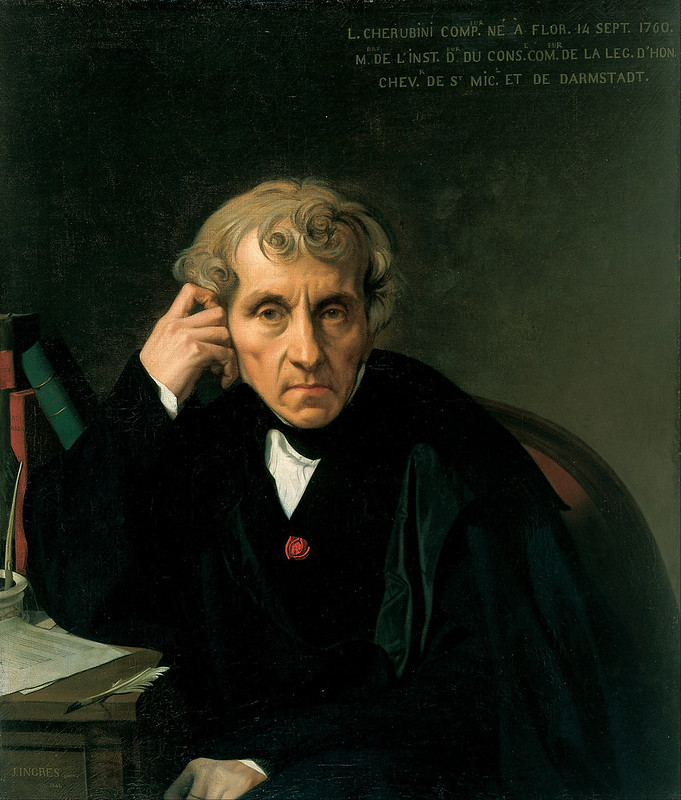Luigi Cherubini (1760-1842)
- Ouverture zu Lodoïska (1791)
Performers: Orchestra Sinfonica di Sanremo; Piero Bellugi (1924-2012, conductor)
Further info: Luigi Cherubini (1760-1842) - Messa Solenne Breve
---
Italian composer and teacher. He first studied music with his father,
the maestro al cembalo at the Teatro della Pergola in Florence, and then
composition with Bartolomeo Felici, and his son Alessandro Felici, and
with Bizarri and Castrucci. In 1778 he received a grant from the Grand
Duke Leopold of Tuscany, which enabled him to continue his studies with
Giuseppe Sarti in Milan. While studying with Sarti, he wrote arias for
his teacher's operas as well as exercises in the early contrapuntal
style. His first operatic success came with Armida abbandonata (1782).
In the autumn of 1784 he set out for London, where he was commissioned
to write an opera for the King's Theatre. La finta principessa (1785),
followed by Il Giulio Sabino (1786), which brought him public acceptance
and the admiration of the Prince of Wales. He made his first visit to
Paris in the summer of 1785, where he was introduced to Marie Antoinette
by the court musician Giovanni Battista Viotti; in the spring of 1786
he made Paris his home. He made one last visit to Italy to oversee the
production of his opera Ifigenia in Aulide (1788). His first opera for
Paris, Demophon (1788), was a failure. In 1789, Leonard, a member of the
Queen's household, assisted by Viotti, obtained a license to establish
an Italian opera company at the Tuileries (Theatre de Monsieur);
Cherubini became its music director and conductor. After the company
moved to a new theater in the rue Feydeau, he produced his opera
Lodoiska (1791), with notable success; he effectively developed a new
dramatic style, destined to have profound impact on the course of French
opera. With the French Revolution in full swing, the Italian Opera was
disbanded (1792). Cherubini then went to Normandy, but returned to Paris
in 1793 to become an inspector at the new Institute National de Musique
(later the Conservatory). His opera Medee (1797), noteworthy for its
startling characterization of Medea and for the mastery of its
orchestration, proved a major step in his development as a dramatic
composer.
With Les Deux Journees, ou Le Porteur d'eau (1800), he scored his
greatest triumph with the public as a composer for the theater; the
opera was soon performed throughout Europe to much acclaim. In 1805 he
received an invitation to visit Vienna, where he was honored at the
court. He composed the opera Faniska, which was successfully premiered
at the Karnthnertortheater (1806). After Napoleon captured Vienna, he
was extended royal favor by the French emperor, who expressed his desire
that Cherubini return to Paris. When Cherubini's opera Pimmalione
(1809) failed to please the Parisians, he retired to the chateau of the
Prince of Chimay, occupying himself with botanizing and painting. At the
request to compose a Mass for the church of Chimay, he produced the
celebrated three-part Mass. He subsequently devoted much time to
composing sacred music. In 1815 he was commissioned by the Philharmonic
Society of London to compose a symphony, a cantata, and an overture. In
1816 he was appointed co-superintendent (with Le Sueur) of the Royal
Chapel, and in 1822 became director of the Paris Conservatory a position
he held until a month before his death. In 1814 he was made a member of
the Institute and a Chevalier of the Legion d'honneur, and in 1841 he
was made a Commander of the Legion d'honneur, the first musician to be
so honored. He was accorded a state funeral, during which ceremony his
Requiem in d (1836) was performed. He was an important figure in the
transitional period from the Classical to the Romantic eras in music.
His influence on the development of French opera was of great historical
significance. He also played a predominant role in music education in
France during his long directorship of the Paris Conservatory. As the
all-powerful director of the Paris Conservatory he established an
authoritarian regimen; in most of his instruction of the faculty he
pursued the Italian type of composition. He rejected any novel
deviations from strict form, harmony, counterpoint, or orchestration,
regarding Beethoven's Ninth Symphony as an aberration of a great
composer's mind.

Cap comentari:
Publica un comentari a l'entrada